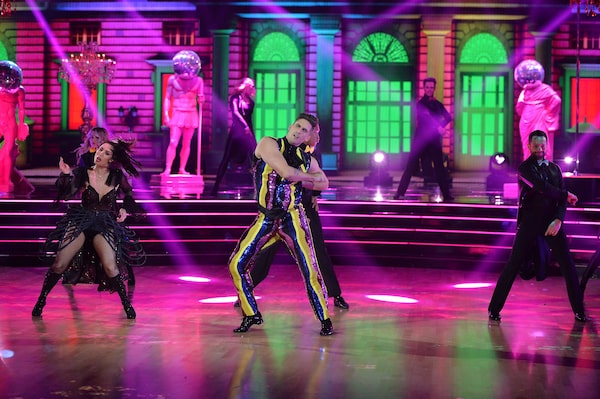
The appearance of Peloton instructor Cody Rigsby, centre, on Dancing with the Stars is one example of how the fitness juggernaut is extending its reach into the spheres of media, fashion and music.Eric McCandless/ABC
When Dancing with the Stars announced its latest batch of celebrity contestants back in September, the list featured the requisite who’s who of reality television – from child star turned YouTube personality JoJo Siwa to former Bachelor Matt James. Then there was Cody Rigsby, a popular Peloton instructor whose often-memed class monologues have turned him into a veritable star on and off the bike.
Rigsby’s placement on the reality competition show is Peloton’s latest entry into the cultural zeitgeist, which has included a recent clothing collection with Beyoncé's athleisurewear brand, Ivy Park, themed classes in collaboration with the likes of Elton John, the Spice Girls and Diddy, not to mention the recent round of media buzz brought forth by Mr. Big’s untimely end on the first episode of Sex and the City sequel, And Just Like That, followed by a subsequent ad (the ad was removed a few days later after allegations of sexual misconduct against actor Chris Noth surfaced). As relaxed pandemic restrictions have allowed people to return to group fitness and indoor gyms, Peloton fatigue seems to be on the rise. At the same time, it seems like the fitness juggernaut is everywhere.
According to statistics published by the Wall Street Journal in October, Peloton subscribers averaged 19.9 workouts per user a month during April, May, and June, compared to 24.7 during the same period last year. This dip coincided with the availability of vaccinations in many Western countries and also follows another trend: In the U.S. the at-home fitness category grew 111 per cent in 2019, but dropped to 50 per cent growth in 2021, according to market research company NDP Group. “What that tells us is that yes, growth could be slowing down, but we’re still seeing huge numbers in terms of growth opportunity,” says Tamara Szames, an industry adviser at NDP.
One such opportunity lies in the sale of new fitness apparel. Only 13 per cent of Americans plan to buy new at-home fitness equipment in the next 60-90 days, with new apparel listed as a top priority in the category, according to NDP. Enter Peloton’s new line of workout gear, which is worn by its roster of instructors during workouts. “You’ll start to see a community being built with merch,” says Szames. Wearing Peloton logos is sure to mimic the cult status that SoulCycle gear had five to 10 years ago.
Peloton is reaching its tentacles into spheres of media, fashion and music in a way that other digital exercise providers like Fitbit and Apple Fitness are not. “Peloton has developed a community not just around their products but around their instructors and brand, it’s become a lifestyle,” says Szames. “This is different than loyal customers that have built Apple’s business. Apple has built loyal customers based on their technology and innovation.” Szames likens it to Amazon’s transformation from book e-tailer to tech giant. “We’re seeing tech influence through many facets of our lives, whether it be streaming, music, media – it all taps into having a loyal consumer base,” she says.
Peloton’s community of almost 6 million members is central to its success, something the brand continues to prioritize as it expands into other product categories. “Our team is constantly thinking about how we intentionally marry cultural moments that are meaningful to our members with opportunities that are true and authentic to the Peloton brand,” says Jennifer Cotter, Peloton’s chief content officer.
Recently, this has meant pushing its weekly artist series – classes that focus on one musician’s repertoire – into new territory, like its feature on Usher, which culminated with the star appearing alongside instructors in a dance cardio class. Its partnership with Beyoncé is its most expansive yet, and includes 17 classes with soundtracks by the singer as well as a social impact component that provides Peloton bikes to the fitness facilities of 10 historically Black colleges and universities (HBCUs) across the U.S. Then there is the Ivy Park collaboration, which launched in November with Peloton instructors sporting the looks on ads, social media and the Peloton platform itself. “Being on the cusp of defining this category is the exciting part,” says Gwen Riley, Peloton’s head of music.
These collaborations have reciprocal benefits, says, Szames, with Peloton gaining exposure to new audiences, and their partners leveraging the Peloton community. “To have Cody on Dancing with the Stars, for example – that brought a new level of engagement onto the show. People who probably would never have watched were watching because their favourite instructor was on.”
And for artists, participating in artist series or digital festivals also provides a low-stakes opportunity to interact with fans. No rehearsals, no travel – just highly active engagement. Dave Dhillon, a Toronto lawyer who, like many, took to the bike to blow off steam during lockdowns, has a dedicated Spotify playlist for artists he’s discovered or deep dived on the Peloton platform. “It’s really reaffirmed my love for Charli XCX,” he says of the British pop singer. As such, Dhillon just bought tickets to her concert next spring.
Sign up for The Globe’s arts and lifestyle newsletters for more news, columns and advice in your inbox.